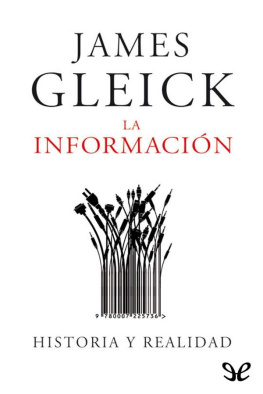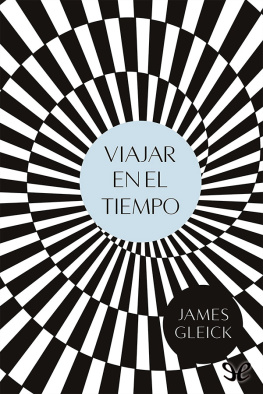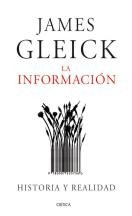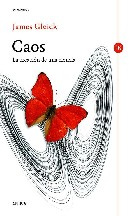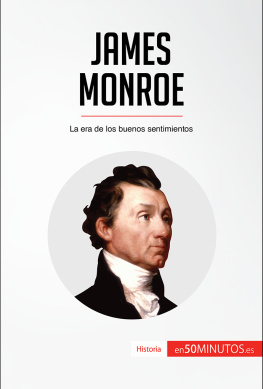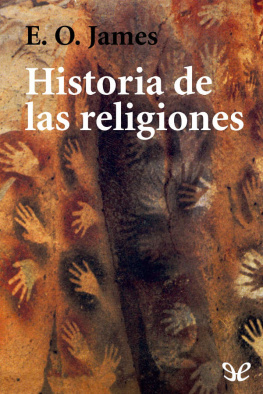James Gleick - La información: historia y realidad
Aquí puedes leer online James Gleick - La información: historia y realidad texto completo del libro (historia completa) en español de forma gratuita. Descargue pdf y epub, obtenga significado, portada y reseñas sobre este libro electrónico. Año: 2011, Editor: ePubLibre, Género: Historia. Descripción de la obra, (prefacio), así como las revisiones están disponibles. La mejor biblioteca de literatura LitFox.es creado para los amantes de la buena lectura y ofrece una amplia selección de géneros:
Novela romántica
Ciencia ficción
Aventura
Detective
Ciencia
Historia
Hogar y familia
Prosa
Arte
Política
Ordenador
No ficción
Religión
Negocios
Niños
Elija una categoría favorita y encuentre realmente lee libros que valgan la pena. Disfrute de la inmersión en el mundo de la imaginación, sienta las emociones de los personajes o aprenda algo nuevo para usted, haga un descubrimiento fascinante.
- Libro:La información: historia y realidad
- Autor:
- Editor:ePubLibre
- Genre:
- Año:2011
- Índice:3 / 5
- Favoritos:Añadir a favoritos
- Tu marca:
- 60
- 1
- 2
- 3
- 4
- 5
La información: historia y realidad: resumen, descripción y anotación
Ofrecemos leer una anotación, descripción, resumen o prefacio (depende de lo que el autor del libro "La información: historia y realidad" escribió él mismo). Si no ha encontrado la información necesaria sobre el libro — escribe en los comentarios, intentaremos encontrarlo.
La información: historia y realidad — leer online gratis el libro completo
A continuación se muestra el texto del libro, dividido por páginas. Sistema guardar el lugar de la última página leída, le permite leer cómodamente el libro" La información: historia y realidad " online de forma gratuita, sin tener que buscar de nuevo cada vez donde lo dejaste. Poner un marcador, y puede ir a la página donde terminó de leer en cualquier momento.
Tamaño de fuente:
Intervalo:
Marcador:
Quiero expresar mi más profundo agradecimiento a Charles H. Bennett, a Gregory J. Chaitin, a Neil J. A. Sloane, a Susanna Cuyler, a Betty Shannon, a Norma Barzman, a John Simpson, a Peter Gilliver, a Jimmy Wales, a Joseph Strauss, a Craig Townsend, a Janna Levin, a Katherine Bouton, a Dan Menaker, a Esther Schor, a Siobhan Roberts, a Douglas Hofstadter, a Martin Seligman, a Christopher Fuchs, al difunto John Archibald Wheeler, a Carol Hutchin… Betty Alexandra Toole; también a mi agente, Michael Carlisle, y como siempre a mi editor, Dan Frank, por su genialidad y por su inagotable paciencia.
Aaboe, Asger. Episodes from the Early History of Mathematics. Nueva York: L. W. Singer, 1963.
Adams, Frederick. «The Informational Turn in Philosophy». Minds and Machines 13 (2003): 471-501.
Allen, William, y Thomas R. H. Thompson. A Narrative of the Expedition to the River Niger in 1841. Londres: Richard Bentley, 1848.
Archer, Charles Maybury (ed.). The London Anecdotes: The Electric Telegraph, vol. 1. Londres: David Bogue, 1848.
Archibald, Raymond Clare. «Seventeenth Century Calculating Machines». Mathematical Tables and Other Aids to Computation 1:1 (1943): 27-28.
Aspray, William. «From Mathematical Constructivity to Computer Science: Alan Turing, John Von Neumann, and the Origins of Computer Science in Mathematical Logic». Tesis doctoral, Universidad de Wisconsin-Madison, 1980.
—, «The Scientific Conceptualization of Information: A Survey». Annals of the History of Computing 7, n. 2 (1985): 117-140.
Aunger, Robert (ed.). Darwinizing Culture: The Status of Memetics as a Science. Oxford: Oxford University Press, 2000.
Avery, John. Information Theory and Evolution. Singapur: World Scientific, 2003.
Baars, Bernard J. The Cognitive Revolution in Psychology. Nueva York: Guilford Press, 1986.
Babbage, Charles. «On a Method of Expressing by Signs the Action of Machinery». Philosophical Transactions of the Royal Society of London 116, n.º 3 (1826): 250-265.
—, Reflections on the Decline of Science in England and on Some of Its Causes. Londres: B. Fellowes, 1830.
—, Table of the Logarithms of the Natural Numbers, From 1 to 108,000. Londres: B. Fellowes, 1831.
—, On the Economy of Machinery and Manufactures. 4.ª ed. Londres: Charles Knight, 1835.
—, The Ninth Bridgewater Treatise. A Fragment. 2.ª ed. Londres: John Murray, 1838.
—, Passages from the Life of a Philosopher. Londres: Longman, Green, Longman, Roberts, & Green, 1864.
—, Charles Babbage and His Calculating Engines: Selected Writings. Editado por Philip Morrison y Emily Morrison. Nueva York: Dover Publications, 1961.
—, The Analytical Engine and Mechanical Notation. Nueva York: New York University Press, 1989.
—, The Difference Engine and Table Making. Nueva York: New York University Press, 1989.
—, The Works of Charles Babbage. Editado por Martin Campbell-Kelly. Nueva York: New York University Press, 1989.
Babbage, Henry Prevost (ed.). Babbage’s Calculating Engines: Being a Collection of Papers Relating to Them; Their History and Construction. Londres: E. & F. N. Spon, 1889.
Bairstow, Jeff. «The Father of the Information Age». Laser Focus World (2002): 114.
Baker, Nicholson. The Size of Thoughts: Essays and Other Lumber. Nueva York: Random House, 1996.
Ball, W. W. Rouse. A History of the Study of Mathematics at Cambridge. Cambridge: Cambridge University Press, 1889.
Bar-Hillel, Yehoshua. «An Examination of Information Theory». Philosophy of Science 22, n.º 2 (1955): 86-105.
Barabási, Albert-László. Linked: How Everything Is Connected to Everything Else and What It Means for Business, Science and Everyday Life. Nueva York: Plume, 2003.
Barnard, G. A. «The Theory of Information». Journal of the Royal Statistical Society, Series B 13, n.º 1 (1951): 46-64.
Baron, Sabrina Alcorn, Eric N. Lindquist, y Eleanor F. Shevlin. Agent of Change: Print Culture Studies After Elizabeth L. Eisenstein. Amherst: University of Massachusetts Press, 2007.
Bartlett, C. J., y Calvin G. Green. «Clinical Prediction: Does One Sometimes Know Too Much». Journal of Counseling Psychology 13, n.º 3 (1966): 267-270.
Barwise, Jon. «Information and Circumstance». Notre Dame Journal of Formal Logic 27, n.º 3 (1986): 324-338.
Battelle, John. The Search: How Google and Its Rivals Rewrote the Rules of Business and Transformed Our Culture. Nueva York: Portfolio, 2005.
Baugh, Albert C. A History of the English Language. 2.ª ed. Nueva York: Appleton-Century-Crofts, 1957.
Baum, Joan. The Calculating Passion of Ada Byron. Hamden, Conn.: Shoe String Press, 1986.
Belot, Gordon, John Earman, y Laura Ruetsche. «The Hawking Information Loss Paradox: The Anatomy of a Controversy». British Journal for the Philosophy of Science 50 (1999): 189-229.
Benjamin, Park. A History of Electricity (the Intellectual Rise in Electricity) from Antiquity to the Days of Benjamin Franklin. Nueva York: Wiley and Sons, 1898.
Bennett, Charles H. «On Random and Hard-to-Describe Numbers». IBM Watson Research Center Report RC 7483 (1979).
—, «The Thermodynamics of Computation - A Review». International Journal of Theoretical Physics 21, n.º 12 (1982): 906-940.
—, «Dissipation, Information, Computational Complexity and the Definition of Organization». En Emerging Syntheses in Science, editado por D. Pines, 297-313. Santa Fé: Santa Fe Institute, 1985.
—, «Demons, Engines, and the Second Law». Scientific American 257, n.º 5 (1987): 108-116.
—, «Logical Depth and Physical Complexity». En The Universal Turing Machine: A Half-Century Survey, editado por Rolf Herken. Oxford: Oxford University Press, 1988.
—, «How to Define Complexity in Physics, and Why». En Complexity, Entropy, and the Physics of Information, editado por W. H. Zurek. Reading, Mass.: Addison-Wesley, 1990.
—, «Notes on the History of Reversible Computation». IBM Journal of Research and Development 44 (2000): 270-277.
—, «Notes on Landauer’s Principle, Computation, and Maxwell’s Demon». arXiv:physics 0210005 v2 (2003).
—, «Publicity, Privacy, and Permanence Information». En Quantum Computing: Back Action 2006, AIP Conference Proceedings 864, editado por Debabrata Goswami. Melville, N.Y.: American Institute of Physics, 2006.
Bennett, Charles H., y Gilles Brassard. «Quantum Cryptography: Public Key Distribution and Coin Tossing». En Proceedings of IEEE International Conference on Computers, Systems and Signal Processing, 175-179. Bangalore, India: 1984.
Bennett, Charles H., Gilles Brassard, Claude Crépeau, Richard Jozsa, Asher Peres, y William K. Wootters. «Teleporting an Unknown Quantum State Via Dual Classical and Einstein-Podolsky-Rosen Channels». Physical Review Letters 70 (1993): 1895.
Bennett, Charles H., y Rolf Landauer. «Fundamental Physical Limits of Computation». Scientific American 253, n.º 1 (1985): 48-56.
Bennett, Charles H., Ming Li, y Bin Ma. «Chain Letters and Evolutionary Histories». Scientific American 288, n.º 6 (junio de 2003): 76-81.
Benzer, Seymour. «The Elementary Units of Heredity». En The Chemical Basis of Heredity, editado por W. D. McElroy y B. Glass, 70-93. Baltimore: Johns Hopkins University Press, 1957.
Berlinski, David. The Advent of the Algorithm: The Idea That Rules the World. Nueva York: Harcourt, 2000.
Bernstein, Jeremy. The Analytical Engine: Computers-Past, Present and Future. Nueva York: Random House, 1963.
Tamaño de fuente:
Intervalo:
Marcador:
Libros similares «La información: historia y realidad»
Mira libros similares a La información: historia y realidad. Hemos seleccionado literatura similar en nombre y significado con la esperanza de proporcionar lectores con más opciones para encontrar obras nuevas, interesantes y aún no leídas.
Discusión, reseñas del libro La información: historia y realidad y solo las opiniones de los lectores. Deja tus comentarios, escribe lo que piensas sobre la obra, su significado o los personajes principales. Especifica exactamente lo que te gustó y lo que no te gustó, y por qué crees que sí.

